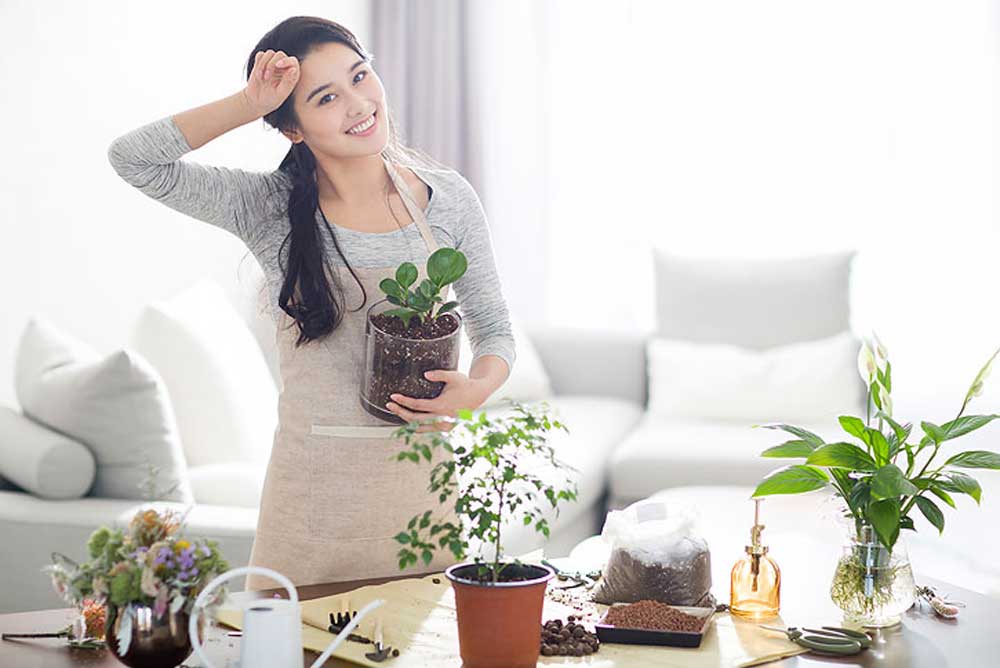If you grow houseplants, you have probably dealt with insect pests. Common pests such as aphids, spider mites and fungus gnats have a knack for infesting indoor plants.
In addition to insect pests, the growing conditions indoors are not always optimal for plants. Dry indoor air and low light levels can be challenging for many houseplants. That doesn’t mean you should give up on growing houseplants. But keeping your indoor plants healthy does require some plant fertilizer, some natural pest control, plus a little TLC. Once you can keep common houseplants healthy, you grow gorgeous flowering houseplants or even make your own terrarium.
Fungus Gnats in Potted Plants
Fungus gnats are small, mosquito-like insects that can infest the potting soil of houseplants and other potted plants. Once they infest a plant, they can be hard to get rid of. Fungus gnats thrive in wet soil, where they lay their eggs. After hatching, the fungus gnat larvae live in the potting soil. In two or three weeks, fungus gnat larvae become tiny pests that fly around like a moving black cloud whenever an infested potted plant is moved.
To help control fungus gnats, allow the potting soil dry out between plant waterings. In addition, organic solutions can also be used to kill fungus gnats.
BTI to the Rescue
Most people don’t know that mosquitoes and fungus gnats are closely related. That’s why fungus gnats can be controlled by a natural mosquito killer called BTI, which is short for Bacillus thuringiensis israelensis. BTI is a bacterium that kills the larvae of both mosquitoes and fungus gnats. Yet, it is harmless to people, pets, plants, and beneficial insects.
BTI is the active ingredient in a widely available product called Mosquito Bits. All you have to do to kill fungus gnat larvae is shake Mosquito Bits onto the potting soil of houseplants. When the plants are watered, the BTI in the Mosquito Bits granules will be released. Fungus gnat larvae will then feed on the BTI and die. You can also make “BTI water” by soaking the Bits in water before you water the plant.
Use Organic Horticultural to Kill Insect Pests
An eco-friendly way is also available to kill adult fungus gnats, aphids, spider mites, scale and other insects on houseplants. Using a lightweight horticultural oil spray will control insects on virtually all kinds of container-grown plants.
Unlike many other pesticides that kill insects with toxic chemicals, horticultural oil literally smothers insects to death. Just spray a horticultural oil, such as organic Summit Year-Round Spray Oil on infected plants. Take the plants outside and try to cover the insects with the oil spray.
Use lightweight horticultural oil any time you see insect pests. The spray oil will not hurt the plants. The lightweight oil is odorless, and it controls insects on even sensitive plants such as tropical houseplants and ferns.
Optimum Growing Conditions
Many indoor plants are native to tropical climates. So, they are accustomed to lots of rainfall and lots of humidity. These plants do not like the dry air inside most homes. That’s why it is important to give plants the humidity they love by misting the air. Use a water mister to spray the air around the plants. Another way to add moisture to the air is to fill a tray will gravel and water. Then, put the plant’s pot directly on the wet gravel. As the water evaporates from the tray, it moistens the air around the plant.
Also, keep the potting soil well watered—but not drenched. Most potted plants benefit from a nice watering and a drying-out period. Just make sure the plant doesn’t get too dry.
Many houseplants benefit from a dose of plant fertilizer, which you can buy online or at garden centers. Follow the instructions on the label to give plants the right dose of plant food. Flowering plants are especially fond of regular fertilization because it entices them to flower and look their best.
Light exposure is also important. Houseplants thrive in light that mimics their native growing conditions. This is especially true in the darker months during wintertime. Don’t be afraid to move plants closer to a window so they get the daylight they need for optimum health. If necessary, a give your plants extra light with a plant light.
Give your houseplants the conditions that they love, and they will reward you with their beauty all year long!
Randy Schultz is a Master Gardener in Colorado Springs, Colorado. He is also the content editor for HomeGardenandHomestead.com, a website filled with helpful advice for homeowners and plant lovers. For daily home and garden tips and ideas, “Like” the Home, Garden and Homestead page on Facebook and Pinterest.


